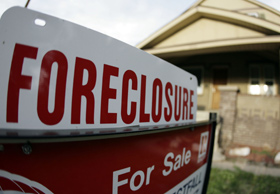| Home | Blog | Ask This | Showcase | Commentary | Comments | About Us | Contributors | Contact Us |

Inequality and the sub-prime crisisASK THIS | February 44, 2008The press doesn't write much about inequality in America -- that would be class warfare, wouldn't it? But now Henry Banta asks if inequality and the enormous money explosion for the very rich since 1980 are reasons for the sub-prime mortgage crisis, or at least for its severity. By Henry Banta There is an obvious question that is not being asked. Perhaps out of thoughtlessness, but perhaps out of fear of the answer. It appears widely accepted that somewhere around 1980 the share of the gross domestic product going to a very small number of the very rich exploded and the share going to everybody else began to slide downward. It also seems widely accepted that the current financial crisis was precipitated by problems in the sub-prime mortgage market. Shouldn’t we be asking if there is a connection? Had the income of the bottom 20 percent been greater – for example, had it kept up with their increase in productivity – would we have a sub-prime mortgage crisis, or would it be as severe? Certainly the banks should not have lent all that money to a bunch of deadbeats. But why were there so many deadbeats in the first place? For a couple of decades we heard that it was the “supply side” that mattered. Our prosperity depended on giving corporations and their shareholders the incentive to invest. Money in the hands of the consumer was wasted. Income redistribution was good as long as it was from bottom to the top. The poor wasted; the rich invested. The road to prosperity was simple: tax consumption; subsidize investment. Few reporters and editors – and few political leaders – ever questioned this principle, and, despite recent events, few are questioning it now. For a long time it has been accepted wisdom that inequality is not an appropriate concern for economic policy. What mattered was business confidence. Any talk about inequality raised the specter of “class warfare” and could undermine investor confidence. It may be a matter of fairness, social justice, equity, and other mushy things that liberal politicians worry about, but not a matter to be discussed among serious people, much less a concern for economic policy. But now the tough, practical people are in a panic over whether the ordinary consumer will keep spending. There is an almost comic scramble to get a few hundred dollars in the hands of consumers in the fervent hope that they will quickly spend them. The whole situation is ripe with irony. Were those who conjured up the idea of repackaging risky sub-prime mortgages as high-grade investments among the few whose income exploded while all the rest lost ground? Did they help create a system that socked it to the middle class and to those aspiring to be middle class, then lent them a lot of money they couldn’t pay back? Could it be that twenty years of stagnant wages, rising debt, and shrinking savings are threatening the very stability of the economy? Could it be that inequality was an important issue after all? Where are Ayn Rand, Milton Friedman, and Ronald Reagan to tell us it isn’t so?
|
||||||||||||




